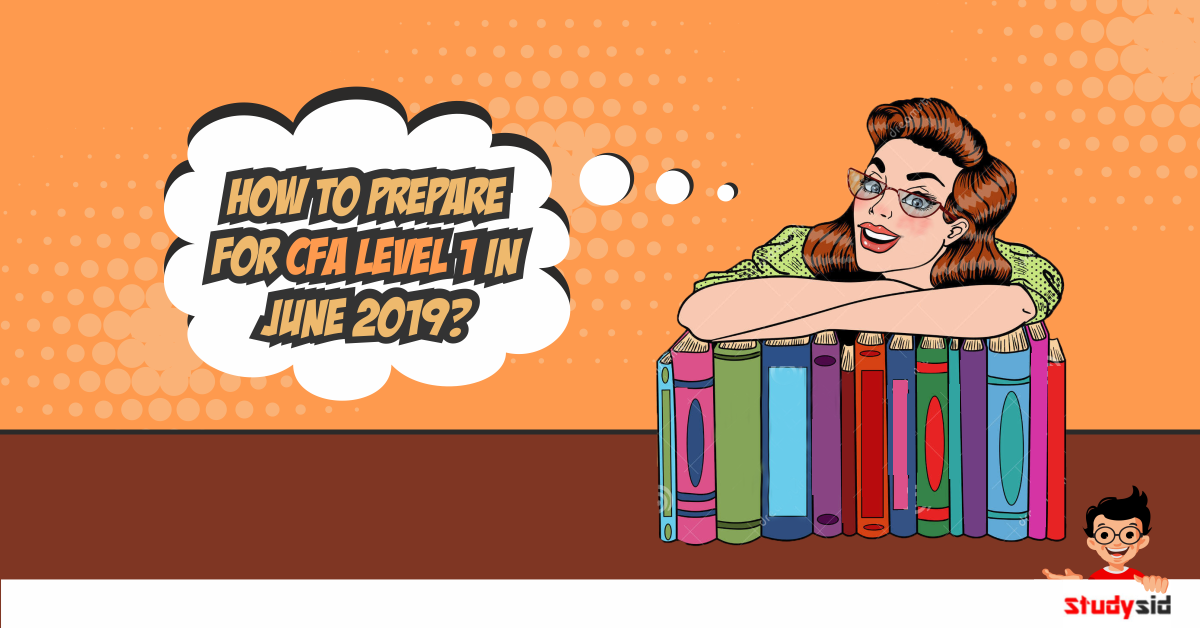CFA Level 1 is the first step towards obtaining the CFA Charter. This exam can be taken twice a year, in the months of June and December respectively. If you’re one of the candidates that have decided to appear for the CFA Level 1 in June 2019, now is the right time to start your exam preparation.

Important Dates:
Registrations are still open for candidates who haven’t registered in the first phase of registration, with the second phase of registration open till 13th Feb 2019. Below is a list of the other important dates that the CFA Level 1 candidates should keep in mind.
| Events | Dates |
| Second Registration Deadline | 13th February 2019 |
| Final Registration Deadline | 13th March 2019 |
| Exam Day: Asia Pacific | 16th June 2019 |
| Religious Alternate Exam Date( Americas and EMEA) | 16th June 2019 |
| Religious Alternate Exam Date( Asia Pacific) | 17th June 2019 |
Exam Registration Fees:
All registration dates end at 11:59 pm ET
| Early registration fee | USD 650 | (ends 17 October 2018) | ||
| Standard registration fee | USD 950 | (ends 13 February 2019) | ||
| Late registration fee |
|
(ends 13 March 2019) |
CFA Level 1 Exam Information:
This is the first of three exams offered by the CFA Institute. Prerequisites for this exam include a Bachelor’s degree or an equivalent. An exemption can be made where you can write the level 1 if you a) are in the final year of your undergraduate program, b) have four years of professional experience or c) have a combination of both, equating to at least four years.
Exam Structure:
The Level I exam consists of 240 multiple choice questions, split between two 3-hour sessions. Candidates must attend both sessions.
- Morning session (3 hours): 120 multiple choice questions, covering all topics
- Afternoon session (3 hours): 120 multiple choice questions, covering all topics
Focus Areas:
In CFA Level I, candidates are asked basic knowledge and comprehension questions and must perform some analysis. Tools and concepts that apply to investment valuation and portfolio management
- Basic concepts regarding securities and markets
- CFA Institute Code of Ethics and Standards of Professional Conduct
Exam Wise Topic Weights:

Sample Questions
An analyst suspects that a particular company’s U.S. GAAP financial statements may require adjustment because the company uses take-or-pay contracts. The most likely effect of the appropriate adjustments would be to increase that company’s
- Return on assets.
- Debt-to-equity ratio.
- Interest coverage ratio.
6 Month Study Plan for Level 1 Aspirants
According to the CFA Institute successful candidates on an average report that they spent approximately 300 hours preparing for the CFA exam in total. The required preparation time can be greater for those with a poor background in the subject matter and less for those who have a strong background in the subjects that the CFA curriculum covers. As a guide for a study plan, let’s use this estimate of 300 hours of reading and practice hours as a benchmark.
The CFA Level I exam covers 10 topics. For a 6 month plan, the study plan can be divided into blocks. Each block covers a mix of the exam topics and time for revision to make sure you have understood the concepts clearly. The study session can be divided into 4 blocks, with the preparation starting from January itself and continuing till June.
| Study Block | I | II | III | IV |
| Tentative Dates | January- February | February- March | March- April | April-May |
| Topics | Ethics | Financial Reporting and Analysis | Fixed Income | Derivative Investments |
| Quantitative Methods | Corporate Finance | Equity Investments | Alternative Investments | |
| Portfolio Management | Economics |
Notes
- Keep in mind this is a tentative study plan. There is no hard and fast rule when one has to start their exam preparation.
- Combine this study plan with regular mock tests, end of chapter questions, revision series to keep yourself updated and in control of your exam preparation.
- Adjust the study plan to give more time to subjects you are weak in accordingly.
In this study plan, There’s a special topic sequence applied to help you focus on the more challenging topics and facilitate the uptake of related topics (that’s why, for instance, you’ll find Portfolio Management follow Quantitative Methods
Level 1 Tips
- Start early and be consistent in your approach. In order to effectively study the entire syllabus and have adequate time for revision and mock tests, it is necessary you start at least 6 months in advance. Don’t try to cram everything into the last few months; starting late and cramming is a recipe for failure.
- Once you create your plan, be disciplined and stick to it! To provide the motivation to stay on task, take a CFA review course and prepare for it like a university course; read the relevant material ahead of time, get at least a big picture of the topics to be covered, and write down any questions you want to ask. Another great way to stick to your plan is to form a study group that meets on a regular basis.
- In general, it is recommended you take all of the topics in the order presented in the CFA curriculum. However, spend just a little time on ethics at the beginning to get a big picture overview, and then really hit the topic hard in the last weeks before the exam.




